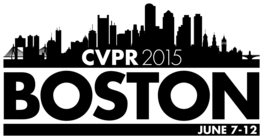-
Discriminative Shape From Shading in Uncalibrated Illumination
AbstractEstimating surface normals from just a single image is challenging. To simplify the problem, previous work focused on special cases, including directional lighting, known reflectance maps, etc., making shape from shading impractical outside the lab. To cope with more realistic settings, shading cues need to be combined and generalized to natural illumination. This significantly increases the complexity of the approach, as well as the number of parameters that require tuning. Enabled by a new large-scale dataset for training and analysis, we address this with a discriminative learning approach to shape from shading, which uses regression forests for efficient pixel-independent prediction and fast learning. Von Mises-Fisher distributions in the leaves of each tree enable the estimation of surface normals. To account for their expected spatial regularity, we introduce spatial features, including texton and silhouette features. The proposed silhouette features are computed from the occluding contours of the surface and provide scale-invariant context. Aside from computational efficiency, they enable good generalization to unseen data and importantly allow for a robust estimation of the reflectance map, extending our approach to the uncalibrated setting. Experiments show that our discriminative approach outperforms state-of-the-art methods on synthetic and real-world datasets.
Related Material
[pdf][bibtex]@InProceedings{Richter_2015_CVPR,
author = {Richter, Stephan R. and Roth, Stefan},
title = {Discriminative Shape From Shading in Uncalibrated Illumination},
booktitle = {Proceedings of the IEEE Conference on Computer Vision and Pattern Recognition (CVPR)},
month = {June},
year = {2015}
}
CVPR 2015 open access
These CVPR 2015 papers are the Open Access versions, provided by the Computer Vision Foundation.
Except for the watermark, they are identical to the accepted versions; the final published version of the proceedings is available on IEEE Xplore.
Except for the watermark, they are identical to the accepted versions; the final published version of the proceedings is available on IEEE Xplore.
This material is presented to ensure timely dissemination of scholarly and technical work.
Copyright and all rights therein are retained by authors or by other copyright holders.
All persons copying this information are expected to adhere to the terms and constraints invoked by each author's copyright.

